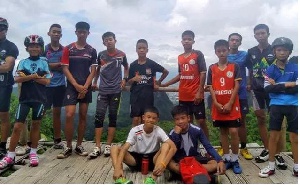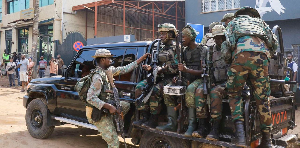On 23rd June, 2018, twelve (12) young footballers of the Wild Boars’ Football team of Thailand with ages ranging from 11 to 16 years and their 25- year old coach, Ekapol Chanthawong decided to celebrate the birthday of one of their soccer mates in the Tham Luang Namg Non cave complex but got trapped in the cave flooded by flash rains.
When the team got stranded in the cave for a period of 17 days, it became a global nightmare which required global cooperation and efforts to save the 13 members of the team.
The survival and rescue of the Thai Wild Boars’ Football team has been described as a miracle.
It will be of great help to understand some of the factors and conditions that helped the stranded young footballers to survive the ordeal of being trapped in a cave for 17 days.
Importance of Leadership in disasters
Situations of disasters and emergencies create emotional and physical stress and the stranded young footballers could have lost hope and faith in their ability to survive which can lead to death.
The efforts of the rescue team would have been fruitless if the young footballers and their coach were unable to survive before rescuers had contact with them. The emergence of a leader who can rise above the despondency that grips a group of people in situations of tragedy is critical for the survival of the group.
Luckily, Coach Ekapol possessed the emotional and physical strength to inspire the group to have hope and faith before being rescued. At the age of ten, Ekapol lost his parents and his brother through the outbreak of a disease and had to live in a Buddhist monastery as a novice monk. The early life experiences of Coach Ekapol had prepared him to cope with difficult situations.
The snacks which the young footballers carried with them into the cave for the celebration of the 16th birthday of their team mate, Pheeraphat Sompiengjai, sustained the group. Coach Ekapol became malnourished because he gave away his share of snacks to the young footballers.
Coach Ekapol’s decision to deny himself of food in that critical situation for the survival of the young footballers is a demonstration of his readiness to make extreme sacrifice for the survival of the group. Such leadership qualities are becoming extinct in our world of greed, avarice and corruption.
Coach Ekapol taught the young footballers survival skills such as using meditation to relieve stress and the need for the group to conserve the little energy in them. A good leader is a teacher whose lessons are well targeted at resolving the critical needs of his/her people.
It was reported that Coach Ekapol wrote a letter which was brought out by the divers stating that, “I promise I will care for the kids as best as possible. I want to say thanks for all the support and I want to apologise to the parents.”
It is a mark of good leadership that Coach Ekapol took responsibility for his actions and inactions that resulted in the tragic incident. He apologised to the parents of the kids and then promised to do his best to take care of the kids. The 33 Chilean miners that were trapped 2,300 feet underground for 69 days believed strongly that a higher being whom they described as the 34th Miner was with them throughout the period they were trapped underground. The Chilean miners credited their miraculous rescue to God indicating the importance of religious beliefs in coping with such stressful situations.
Coach Ekapol acted like Mario Sepulveda (Super Mario) who was among the 33 Chilean miners that were trapped in an underground copper mine in Chile for 69 days in 2010. Mario was recognised as the leader of the miners and the one who inspired them to have hope and faith in their ability to survive. Coach Ekapol was a leader who was fit for the purpose of the survival of the Wild Boars’ Football team when they were trapped in the cave.
Group Solidarity
The Thai Footballers had been training together and had a team spirit which was necessary for the survival of the group in the situation in which they found themselves. The group encouraged themselves and they had learnt to live together to the extent that when the rescue team found them, no member of the group showed signs of being in a hurry to leave the cave and abandon their colleagues.
Some of the letters from the children in the cave released by divers indicated that they were in very high spirits as a group. One of the kids wrote jokingly, “Don’t worry, we are all strong; Teacher, don’t give us lots of homework.”
The young footballers have rekindled the dying value of gratitude with their expression of heartfelt thanks to those who worked in very dangerous conditions to save them especially Saman Gunan , the former member of Thai Navy SEAL who died in the course of the rescue operations.
Support of the international community
There was overwhelming response of the international community to the plight of the 12 young Thai footballers and their coach who were trapped in the cave. The rescue effort benefited from technical skills from all over the world including rare skills which contributed to the success of the rescue team.
Dr Richard Harris, an anaesthetist and experienced cave diver who was on holidays in Thailand had to cut his holidays short to join the Thai Navy SEALs in the rescue operations. The two British divers, Rick Stanton and John Volanthen who were the first divers to establish contact with the stranded football team and Dr Richard Harris braved the dangerous nature of the rescue operations without monetary consideration.
The rescue operations of the Thai Wild Boars’ Football team provide a very good example of selfless commitment to humanity at the peril of the lives of the rescuers whose only motivation was to save lives. These and other gallant members of the rescue team worked together to give meaning to global citizenship which is necessary in the building of a peaceful world of people with common interest and destiny.
Dr Richard Harris and the two British volunteer divers engaged in heroic deeds and have demonstrated so much humility to the extent that they do not want to be regarded as heroes. It was a period when the world behaved as if we lived in a borderless world of global citizens who cared about what happened to all citizens of the world no matter how far they lived from each other. The advertisement of the people of Thailand to express their heartfelt gratitude to the world for the global support in the rescue of the young footballers stated that, ‘The World is One.’
Observing safety rules
There are very common stories in our daily lives about how expeditions of some fun seeking youth had ended in unfortunate tragedies because the group failed to observe some basic safety rules.
The members of the Thai Wild Boars’ Football team ignored the safety signage that warned visitors not to enter the Tham Luang Namg Non cave complex from July to November because of the possibility of floods in addition to the fact that visitors who wanted to enter the cave had to report to the national park ranger station. We need to take safety issues seriously when we undertake fun expeditions on mountains, beaches among others to avoid such tragedies.
The writer is the General Secretary of the Maritime and Dockworkers’ Union and the Executive Director of Wacam (Part Time). He is an ADR Practitioner and a Human Resource Development Specialist.
Opinions of Friday, 17 August 2018
Columnist: Daniel Owusu-Koranteng















